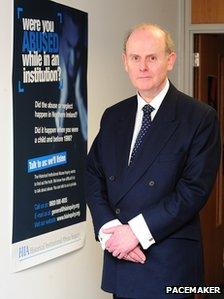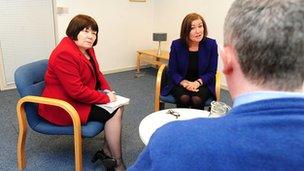Historical Abuse Inquiry investigates 35 NI institutions
- Published

The inquiry will be chaired by Sir Anthony Hart
A state inquiry into historical institutional child abuse in Northern Ireland will initially investigate 35 residential facilities.
The locations include 15 state-run children's homes, 13 institutions run by Catholic Church orders and four borstals or training schools.
Three institutions run by Protestant churches or voluntary organisations will also be investigated.
Chairman of the inquiry Sir Anthony Hart revealed the number on Thursday.
The statutory inquiry was set up by the Northern Ireland Executive to investigate institutions run by the state and church and also those owned by the private sector or voluntary bodies from 1922 to 1995.
More than 175 people have so far contacted the inquiry to outline their experiences in care, with 89 interviewed to date.
A similar number are yet to be interviewed.
Further claims
Allegations made so far have led to the light being shone on the 35 facilities.
If more victims come forward and make further claims, more institutions could be examined.
To date the inquiry has identified more than 170 facilities that operated during the time period, including children's homes, orphanages, industrial schools, workhouses, borstals, hospital units and schools for children with disabilities.
Pensioners in their 80s are among those who have outlined claims of childhood abuse to the inquiry.
At the other end of the age spectrum, people in their 30s have also come forward and spoken to the inquiry's acknowledgement forum panel, member Norah Gibbons revealed.
Older former residents of children's homes would not have been able to tell their stories if the original terms of the region's historical abuse investigation had not been redrawn last year to extend the start date of the time period covered from 1945 to 1922.
Ms Gibbons, who worked on the Ryan Commission into child abuse in the Republic of Ireland, is one of four experts who make up the forum panel.
They are the first point of contact for anyone who wants to relay their experiences to the inquiry.
Those who come forward can limit their engagement with the inquiry to just the forum, or decide to progress and give evidence to the inquiry's lawyers in the public phase of the investigation.
Four out of every five interviewed have signalled a willingness to go before an inquiry hearing.
"Our role is to listen carefully and to hear what people want to tell us about their experiences," Ms Gibbons said of the acknowledgement forum.
"People when they come in may be upset, may be distressed, they may find going back into their past very difficult, so our job is to make that as easy as we can for them."
Range of institutions
She said it was important that participants felt in control of what was happening.

This reconstruction shows the work of the forum panel - the first point of contact for anyone who wants to relay their experiences to the inquiry
"We have spoken to a range of people covering a range of institutions and locations where institutions were, and a range of different types of institutions," she said.
"So we are beginning to get, I do stress beginning to get, a picture of what perhaps life was like at different times in different places as experienced by the people who have come in."
Ms Gibbons said she realised that people would find it difficult to decide whether to come forward.
"Perhaps family members don't know they were ever in an institution, perhaps their workplace doesn't know and it is something that they have decided to deal with by keeping it buried," she said.
"So we want to make sure that everybody who wants to come is afforded that opportunity while accepting that for some people it is not the thing that they would wish to do."
She said said many abuse victims also felt embarrassed.
"For some people coming forward is very difficult for a number of reasons," she said.
"It is painful, it can be painful for people and for some people they are embarrassed because, although they were children and in no way to blame for anything that happened, they can carry a feeling of guilt that in some way they must have contributed to what happened and that is a huge burden for somebody to be asked to carry."
The acknowledgement forum panel will eventually produce a report to inquiry chair Sir Anthony Hart detailing the various experiences recounted to them in a way that will preserve anonymity .
- Published26 September 2012
- Published4 August 2012
- Published2 May 2012
- Published21 September 2011
- Published21 January 2011